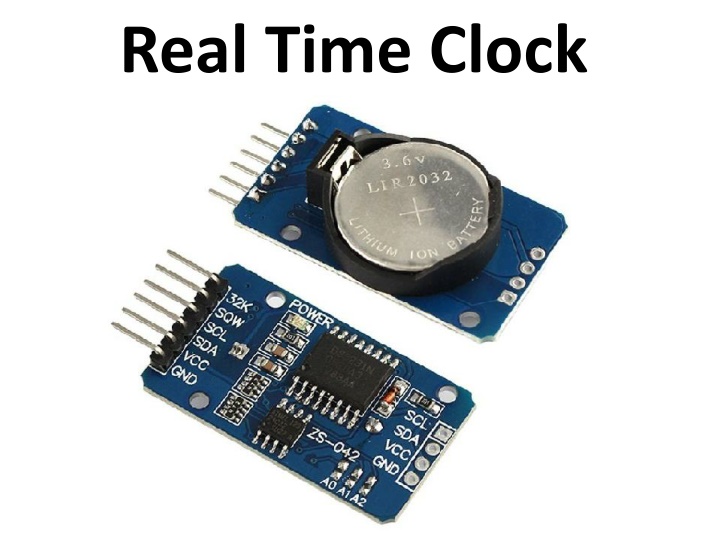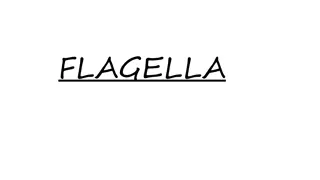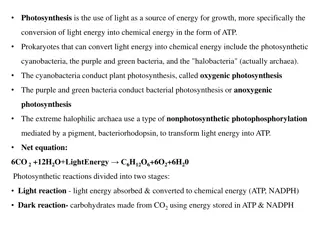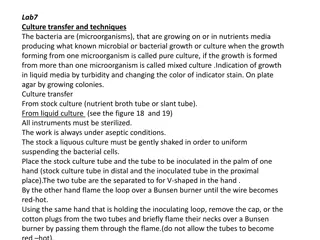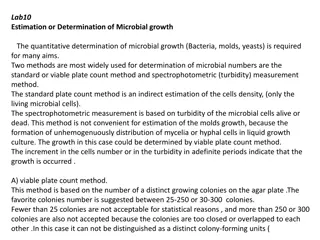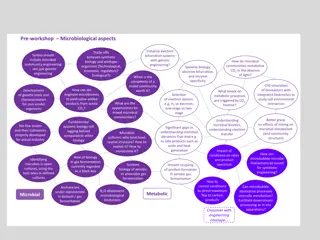Microbial Growth and Bacterial Behavior: Insights and Impacts
Delve into the fascinating world of microbial growth and bacterial behavior, exploring the history of bacterial cultivation, the marvel of bacteria in extreme environments, the concept of bacterial growth in colonies, and the intriguing doubling time phenomenon. Discover how bacteria adapt and thrive in natural settings, showcasing unique behaviors that differ from laboratory conditions.
Download Presentation

Please find below an Image/Link to download the presentation.
The content on the website is provided AS IS for your information and personal use only. It may not be sold, licensed, or shared on other websites without obtaining consent from the author.If you encounter any issues during the download, it is possible that the publisher has removed the file from their server.
You are allowed to download the files provided on this website for personal or commercial use, subject to the condition that they are used lawfully. All files are the property of their respective owners.
The content on the website is provided AS IS for your information and personal use only. It may not be sold, licensed, or shared on other websites without obtaining consent from the author.
E N D
Presentation Transcript
I2C protokol (Philips, 1982) I2C ili IIC Inter Integrated Circuits SCL Serial CLock SDA Serial DAta
Arduino I2C Wire biblioteka #include <wire.h> Postoje i druge biblioteke za I2C komunikaciju: rinkydinkelectronics.com, <DS3231.h> PDF!
Test 01 #include <DS3231.h> // Init the DS3231 using the hardware interface DS3231 rtc(SDA, SCL); void setup() { // Setup Serial connection Serial.begin(9600); // Uncomment the next line if you are using an Arduino Leonardo //while (!Serial) {} // Initialize the rtc object rtc.begin(); // The following lines can be uncommented to set the date and time //rtc.setDOW(SUNDAY); // Set Day-of-Week to SUNDAY //rtc.setTime(13, 10, 00); // Set the time to 12:00:00 (24hr format) //rtc.setDate(03, 05, 2020); // Set the date to January 1st, 2014 }
Test 01 void loop() { // Send Day-of-Week Serial.print(rtc.getDOWStr()); Serial.print(" "); // Send date Serial.print(rtc.getDateStr()); Serial.print(" -- "); // Send time Serial.println(rtc.getTimeStr()); // Wait one second before repeating :) delay (2000); }
Test 02 #include <DS3231.h> // Init the DS3231 using the hardware interface DS3231 rtc(SDA, SCL); // Init a Time-data structure Time t; void setup() { pinMode(13, OUTPUT); // Setup Serial connection Serial.begin(9600); // Uncomment the next line if you are using an Arduino Leonardo //while (!Serial) {} // Initialize the rtc object rtc.begin(); // The following lines can be uncommented to set the date and time //rtc.setDOW(SUNDAY); // Set Day-of-Week to SUNDAY //rtc.setTime(13, 50, 00); // Set the time to 12:00:00 (24hr format) //rtc.setDate(03, 05, 2020); // Set the date to January 1st, 2014 }
Test 02 void loop() { // Get data from the DS3231 t = rtc.getTime(); // Send date over serial connection Serial.print("Today is the "); Serial.print(t.date, DEC); // date Serial.print(". day of "); Serial.print(rtc.getMonthStr()); // rtc.getMonthStr() Serial.print(" in the year "); Serial.print(t.year, DEC); // year Serial.println("."); // Send Day-of-Week and time Serial.print("It is the "); Serial.print(t.dow, DEC); Serial.print(". day of the week (counting monday as the 1th), and it has passed "); Serial.print(t.hour, DEC); Serial.print(" hour(s), "); Serial.print(t.min, DEC); Serial.print(" minute(s) and "); Serial.print(t.sec, DEC); Serial.println(" second(s) since midnight.");
Test 02 // Send a divider for readability Serial.println(" - - - - - - - - - - - - - - - - - - - - -"); // Wait one second before repeating :) delay (1000); if (t.hour>0 && t.hour<7){ Serial.println("NIGHT"); } if (t.hour>=7 && t.hour<10){ Serial.println("MORNING"); } if (t.hour>=10 && t.hour<18){ Serial.println("DAY"); } if (t.hour>=18 && t.hour<24){ Serial.println("EVENING"); } delay(1000); Serial.println(rtc.getTemp()); delay(1000); }
Bounce const int buttonPin = 2; const int ledPin = 13; int ledState = LOW; boolean buttonState = LOW; Buttonstate -> LOW Buttonstate -> HIGH int numPress = 0; void setup() { pinMode(ledPin, OUTPUT); pinMode(buttonPin, INPUT); } void loop() { if(digitalRead(buttonPin)==HIGH && buttonState==LOW){ numPress++; buttonState = HIGH; } //else{ if(digitalRead(buttonPin)==LOW && buttonState==HIGH){ buttonState=LOW; } //} if(numPress == 10){ digitalWrite(ledPin, HIGH); } }
Debounce const int ledPin = 13; int ledState = LOW; boolean buttonState = LOW; boolean debounceButton(boolean state){ boolean stateNow = digitalRead(buttonPin); if(state!=stateNow){ delay(10); stateNow = digitalRead(buttonPin); } return stateNow; } int numPress = 0; void setup() { pinMode(ledPin, OUTPUT); pinMode(buttonPin, INPUT); } void loop() { if(debounceButton(buttonState)==HIGH && buttonState==LOW){ numPress++; buttonState = HIGH; } //else{ if(debounceButton(buttonState)==LOW && buttonState==HIGH){ buttonState=LOW; } //} if(numPress == 10){ digitalWrite(ledPin, HIGH); } }
